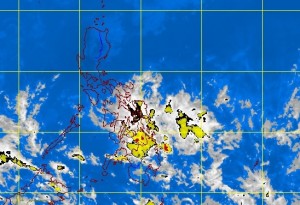MANILA, Philippines—The temperature in Metro Manila dipped to below 20 degrees Celsius on the first day of 2014, signaling cool mornings ahead in the capital this month.
The Philippine Atmospheric, Geophysical and Astronomical Services Administration (Pagasa) said a temperature reading of 19.2 degrees was recorded at the agency’s Science Garden in Quezon City early Wednesday morning.
The reading was made at 5:20 a.m., weather observer Viviene Relos said.
It was the coolest day so far in Metro Manila since the Christmas season began.
The coldest day of 2013 in Metro Manila was on January 23 when the mercury plunged to 18.1 degrees, while in Baguio City, it was on January 14, at 9.5 degrees.
This New Year’s Day, Baguio experienced a temperature of 11.8 degrees Celsius between 2 and 6 a.m.
Although the cold season typically begins in October, with the onset of the northeast monsoon, or cold winds blowing from Siberia, the coldest days of the year are usually felt between January and February when the monsoon is at its peak.
The northeast monsoon, locally known as “hanging amihan,” remains prevalent over Northern and Central Luzon, while the trough or extension of a low-pressure area is affecting Mindanao, Pagasa said.
According to Pagasa’s 24-hour weather outlook, Visayas and Mindanao will have cloudy skies with light to moderate rain showers and thunderstorms.
Metro Manila and the regions of Cagayan Valley, Ilocos, Cordillera and Central Luzon will experience partly cloudy to cloudy skies with isolated light rains, it added.
The rest of the country will be partly cloudy to cloudy with isolated rain showers or thunderstorms, Pagasa said.
Moderate to strong winds blowing from the northeast will prevail over Luzon and eastern Visayas and the coastal waters along these areas will be moderate to rough. Elsewhere, winds will be light to moderate coming from the northeast with slight to moderate seas, it said.
